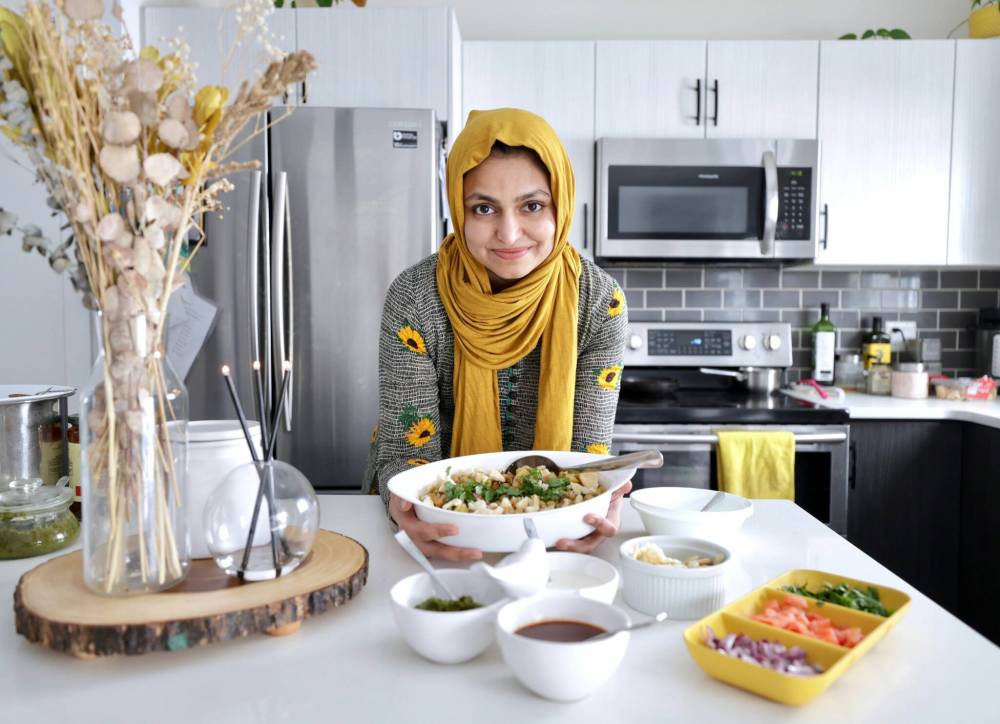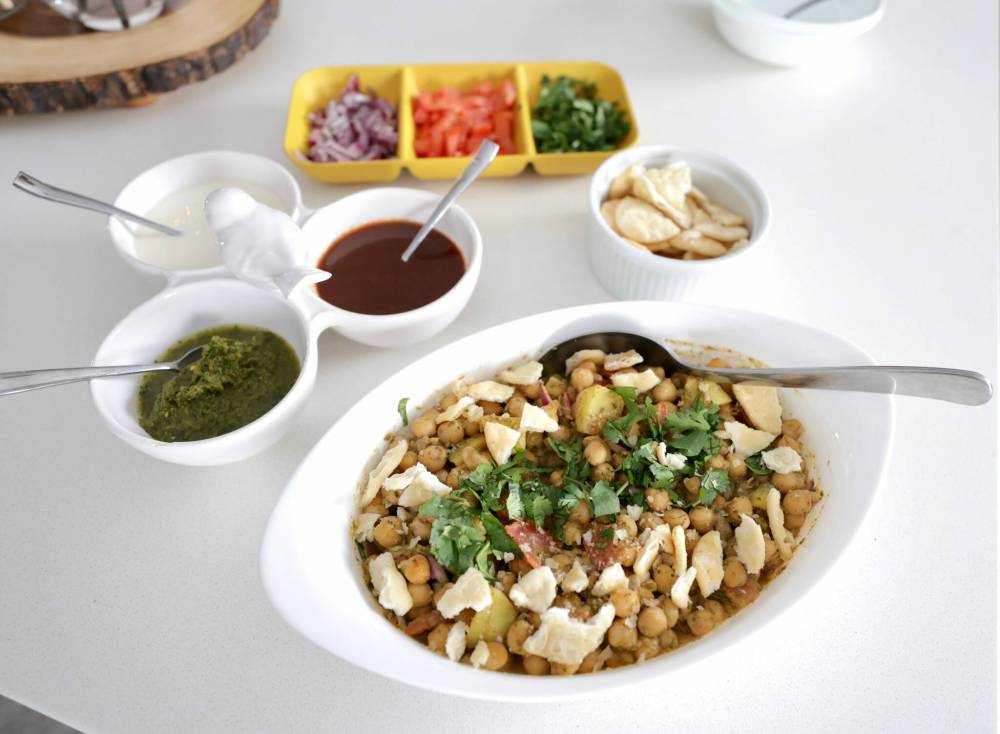Nourishing body and soul For Nida Ghazanfar, Ramadan is a time to celebrate family and faith with good, nutritious food
Read this article for free:
or
Already have an account? Log in here »
To continue reading, please subscribe:
Monthly Digital Subscription
$0 for the first 4 weeks*
- Enjoy unlimited reading on winnipegfreepress.com
- Read the E-Edition, our digital replica newspaper
- Access News Break, our award-winning app
- Play interactive puzzles
*No charge for 4 weeks then price increases to the regular rate of $19.00 plus GST every four weeks. Offer available to new and qualified returning subscribers only. Cancel any time.
Monthly Digital Subscription
$4.75/week*
- Enjoy unlimited reading on winnipegfreepress.com
- Read the E-Edition, our digital replica newspaper
- Access News Break, our award-winning app
- Play interactive puzzles
*Billed as $19 plus GST every four weeks. Cancel any time.
To continue reading, please subscribe:
Add Free Press access to your Brandon Sun subscription for only an additional
$1 for the first 4 weeks*
*Your next subscription payment will increase by $1.00 and you will be charged $16.99 plus GST for four weeks. After four weeks, your payment will increase to $23.99 plus GST every four weeks.
Read unlimited articles for free today:
or
Already have an account? Log in here »
Hey there, time traveller!
This article was published 23/03/2023 (996 days ago), so information in it may no longer be current.
For Nida Ghazanfar, Ramadan is as much about eating as it is about fasting.
“It’s a time to really focus on nutrition,” she says. “It’s really important that we nourish and give our bodies the tools that it needs to keep us going.”
Food is a constant fascination for the Winnipeg nutritionist and during the Muslim holy month, which began this week, she aims to practice the dietary balance she preaches to clients year-round.

Homemade is a Free Press series celebrating home cooking in Manitoba. We are currently looking for Easter and Passover dishes to feature in the paper. Visit Homemade to submit a recipe and join our Facebook group.
For 30 days, she will abstain from eating and drinking between sunrise and sunset. To prepare, Ghazanfar has spent weeks meal-planning and batch-cooking nutritionally dense meals, while leaving room for convenience foods when she doesn’t feel like cooking and deep-fried Pakistani delicacies, such as samosas and pakoras.
“We make, like, one day out of the week where we can enjoy a bit of our traditional fried foods,” she says. “They’re really delicious… but you don’t feel good after eating them.”
Chana chaat — a chickpea and potato salad served with a trio of flavourful sauces — is something she often makes for iftar, the evening meal to break the fast. The dish, usually served alongside dates, offers a quick hit of energy.
“It’s very light and simple, so it would be enough for us to go and do our evening prayers and then we would come back for a full meal,” she says.
Ghazanfar’s chana chaat recipe comes from her mother.
“And I think she would make a far better version of it,” she says with a laugh. Her mother and mother-in-law are major sources of inspiration in the kitchen.
“It’s a time to really focus on nutrition… It’s really important that we nourish and give our bodies the tools that it needs to keep us going.”–Nida Ghazanfar
“Traditional foods are kind of dying out from our culture and I want to keep that tradition going. I want to learn everything I can from my mom so I can pass it onto my kids and my boys can take it forward.”
Ghazanfar was born in California, spent her childhood in Pakistan and moved to Winnipeg in her 20s, where she and her husband are raising two sons, aged two and seven years old. Motherhood prompted the business school graduate to pursue a new career path.
“I really wanted to switch gears and do something I was really passionate about,” she says. “I’ve always been interested in nutrition. As a young child I remember eating cereal and reading the ingredients on the boxes.”
Through her practice, Apple Flavoured Oranges, Ghazanfar works with clients of all backgrounds while also serving those interested in culturally specific nutrition advice. She runs workshops for seniors through the Manitoba Islamic Association and has held seminars on Ramadan-specific nutrition.
RUTH BONNEVILLE / WINNIPEG FREE PRESS Nida Ghazanfar’s chana chaat recipe comes from her mother. ‘I want to keep that tradition going. I want to learn everything I can from my mom so I can pass it onto my kids.’
Community is another important aspect of Ramadan for Ghazanfar. While her extended family lives elsewhere, she’ll be hosting her parents this month. It’s a chance for her kids — who are too young to join in the fasting — to experience some of the multigenerational traditions she enjoyed growing up in Pakistan.
“(My son) is super excited about breaking the fast with everybody and being at the table,” she says. “Even though it’s going to be like 9 p.m. and he’s supposed to be in bed.”
At sundown, the house takes on a special air, with people rushing to meet the darkness with food and prayer.
“We’re really focused on that congregation and coming together and praying together — that’s really special,” Ghazanfar says. “We have this little bubble inside of our house outside of everything that’s still going on, like the school schedule and work.
“It is challenging here because not everybody’s doing the same thing,” she says. “But it also brings us closer together.”
“It is challenging here because not everybody’s doing the same thing… But it also brings us closer together.”–Nida Ghazanfar
Another thing she’s looking forward to this year? Sleep.
Ramadan follows the Islamic lunar calendar and its timing shifts from year-to-year. Springtime, when the days are shorter, makes for a more manageable schedule.
“When Ramadan is around June and July we would have, like, really long fasts,” she says. “Your eating window is really little, if you think about it, and you also have to sleep.”
More darkness also means more time for suhoor. The morning meal, eaten before sunrise, has become one of Ghazanfar’s most cherished Ramadan rituals.
“It’s just me and my husband, everybody else is asleep… and we can have a conversation over breakfast,” she says. “That is more special to me, personally, especially after having kids. That peace and quiet is so nice.”
RUTH BONNEVILLE / WINNIPEG FREE PRESS Chana chaat — a chickpea and potato salad served with a trio of flavourful sauces — is something Nida Ghazanfar often makes for iftar, the evening meal to break the daily fast during Ramadan, which began Thursday.
Chana Chaat
Submitted by Nida Ghazanfar
CILANTRO CHUTNEY
1/2 onion
1/2 tomato
4-5 cloves garlic
1 bunch of cilantro
2-3 green chilies, to taste
Juice of half a lemon
1 tbsp vinegar
1/2 tsp cumin seeds
1/4 tsp red chili powder, to taste
Place ingredients in a blender and blend until smooth. Add a splash of water, if needed, to get things moving. Store in the fridge for 3 weeks or in the freezer for 6 months.
TAMARIND CHUTNEY
7 oz whole tamarind
1 1/2 tsp cumin powder
1 tsp Kashmiri Lal Mirch (ground red chili powder)
1/2 tsp garam masala powder
1 tsp salt
1/2 tsp black salt
1 tsp ginger powder
1 tsp red chili flakes
1 cup jaggery, coconut sugar or white sugar
Submerge the tamarind in water and soak for 4 to 6 hours or overnight. Strain the tamarind and water into a pot, pressing through a fine sieve to remove the seeds and skin. Place the pot on the stove over medium heat. Add spices and sugar and cook for 45 minutes or until the sauce is nice and thick. The chutney will thicken further in the fridge.
YOGURT SAUCE
1/2 cup full-fat plain yogurt
2-3 tbsp maple syrup or sugar
Mix the yogurt and sugar together and set aside.
CHANA CHAAT
1 1/2 cups dried chickpeas, soaked overnight
1 1/2 tsp cumin powder
1 1/2 tsp chaat masala
1 tsp salt
1 tomato, diced
1 onion, diced
2 potatoes, diced
Handful cilantro, chopped
Chat papdi, optional but adds a nice crunch
Add soaked chickpeas to a pressure cooker, cover with water and cook on high for 30 minutes.
Boil diced potatoes until tender. Drain and season with salt and pepper.
Drain chickpeas, place in a large bowl and toss with seasonings. Stir in potatoes, onion, tomato and cilantro. Add both chutneys and yogurt sauce, to taste. Crush chat papdi (fried crackers) and mix into salad before serving.
Note: Chana chaat can be served dissassembled, allowing diners to build the salad to their preference at the table.
eva.wasney@winnipegfreepress.com
Twitter: @evawasney

Eva Wasney has been a reporter with the Free Press Arts & Life department since 2019. Read more about Eva.
Every piece of reporting Eva produces is reviewed by an editing team before it is posted online or published in print — part of the Free Press‘s tradition, since 1872, of producing reliable independent journalism. Read more about Free Press’s history and mandate, and learn how our newsroom operates.
Our newsroom depends on a growing audience of readers to power our journalism. If you are not a paid reader, please consider becoming a subscriber.
Our newsroom depends on its audience of readers to power our journalism. Thank you for your support.











